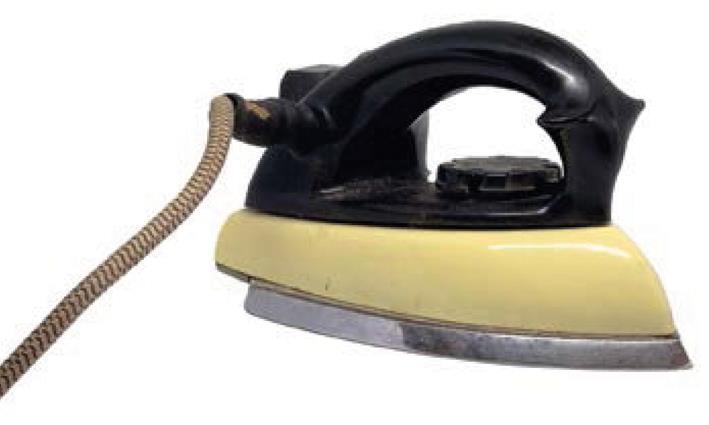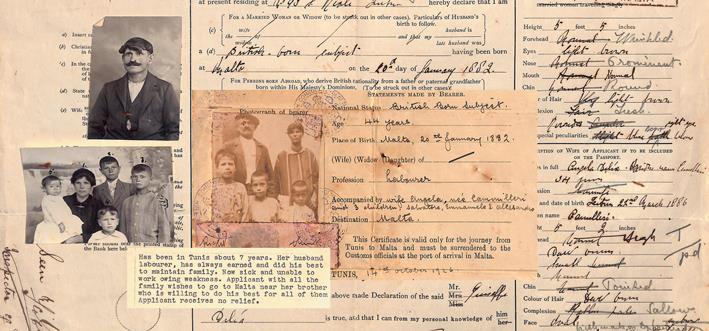According to the story which is told by the family your grandmother decided to emigrate to Tunisia with her six sons. Malta was poor, no jobs, no natural resources. Could you please give us a little background about yourself and your family's connections with Tunisia.
My paternal Maltese family emigrated to Tunisia in 1921. My nannu was born in Zejtun and was only a six -year-old boy when he went there. My dad was born in Tunisia.
I went to Tunisia for just a few days in 2000 for work, but it is only in 2017, that I decided to explore further where my family used to live and work.
One day, I entered a small shop and inside was an exact copy of an old photo I had of my grandparents shop back then. This had not been their shop but theirs was a similar one a few streets away in Kheireddine. I was intrigued and I returned to Tunisia several times in 2019 to conduct my research.

Can you tell us more about your family's journey as immigrants?
After the independence of Tunisia in 1956 and the nationalisation of the country, foreigners were no longer welcome there. My grandfather's small business was successful and my grandmother's cooking appreciated by patrons. But maybe this modest success made some jealous so considering everything the family decided to leave for France. But my grandfather was proud of his Maltese roots, so he made enquiries about returning to Malta with his family. The Maltese administration did not make it easy for them, as the Maltese diaspora abroad at the time was huge. They did not want a massive number of Maltese citizens to return to the tiny island. So, they were encouraged to find refuge elsewhere. Although administratively complicated the Delia family somehow managed to return to Malta where they stayed for two years but soon realized they had made the wrong decision. So they tried their luck in France in 1963 and settled in Marseille.
However, their journey of immigration did not stop there. After seven years, the family returned to Malta except for my father who remained in France.

Where are you living at present?
I was born and grew up in France. I have been living in Malta since 2016. I conducted research at the National Archives which helped tremendously with the book.
Malta is not new to me. I had been visiting Malta since my young years as my grandparents used to live at Santa Lucija.
I have always been attracted to Malta but I have seen it change over the last decade. I spent many holidays here but at some point in my life I wanted to get to know more about the island through the lenses of an inhabitant. So here I am.
When I settled in Malta, I was shocked that many Maltese of my generation and even older did not know about the Maltese immigration to North Africa. To many Maltese immigration means mainly Australia, Canada and the US.
It became even more important for me to write the story of my family; to share it as today the immigration journey is in the opposite direction. Tunisians are now coming to Malta. I believe that knowing our history, helps us to understand and empathize with each other.
By living in Malta I am in a position to track down those places where old photos were taken. You can find both old and contemporary photos in the book. At the National Archives I learnt more about the migration journey. It was far more complex than the story told by the family.

I suppose you speak both French and Arabic as well as English?
I speak French which is my mother tongue. Thanks to my move to Malta, now I can say I speak English. That was not really the case before. I understand more and more Maltese and I can speak a little but not yet enough to have a proper discussion.
I grew up in Brittany, west part of France, where there were no Maltese living. My father did not pass on the Maltese language to his three daughters as my grandparents in addition to speaking Maltese used to speak good French. They learnt it while they were living in Tunisia. No, I do not speak Arabic at all. However, for me it was very important for the book to be in three languages. The three are part of the story. It is rare to have those three languages together. Nevertheless the three countries are geographically close.
I know there aren't many Maltese left in Tunisia. Many had emigrated to France. About how big is the Maltese community that is left ?
Yes, the Maltese diaspora in Tunisia is very small. When I did my research there, I can say that although the Maltese left the country they still remain in the memories of Tunisians.
Do you have any further plans to write?
Recently, with the two Maltese authors Clare Azzopardi and Leanne Ellul, we were commissioned by the Maltese Embassy in Tunisia to create a book about the Maltese Diaspora in Tunisia. We produced Minn Marsa ghal Marsa: Stejjer mit-Tunezija which has been shortlisted by the National Book Council for the 2024 National Book Prize & Terramaxka Prize. We are naturally delighted.
With the announcement of such good news we wrapped up the interview.